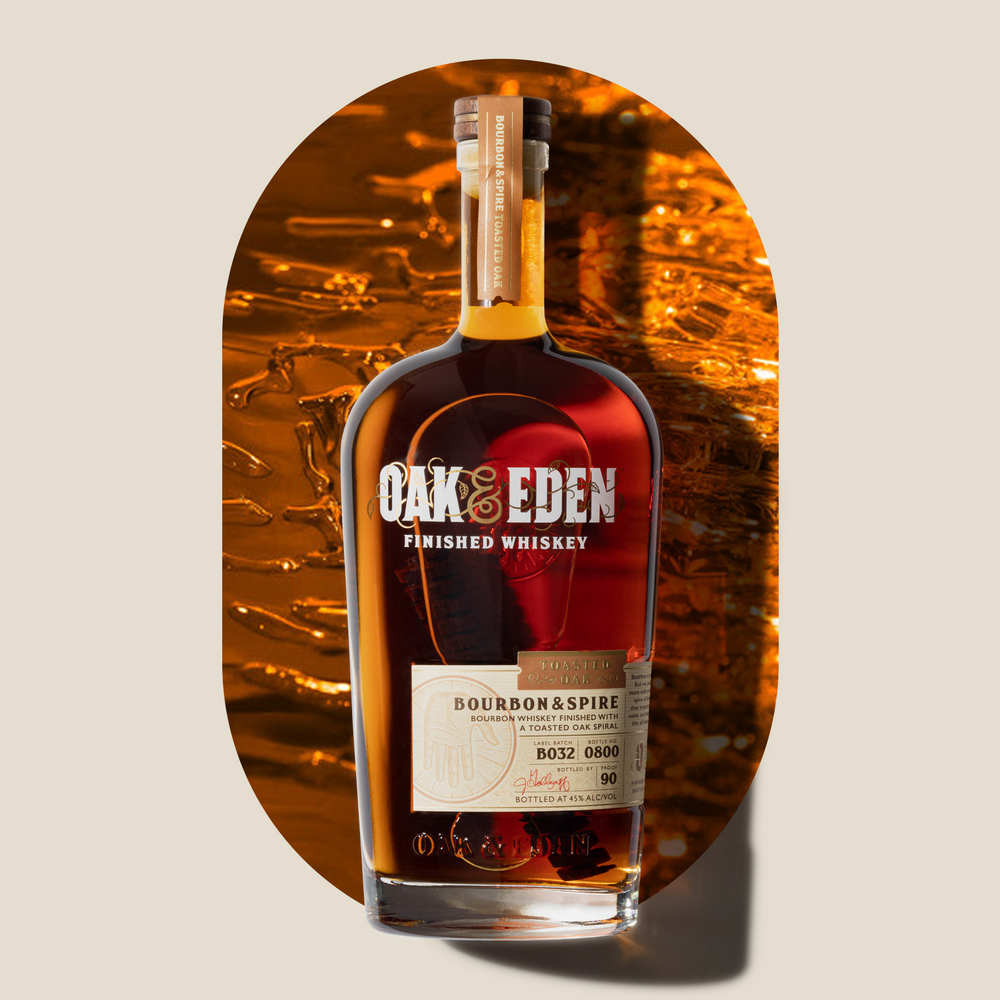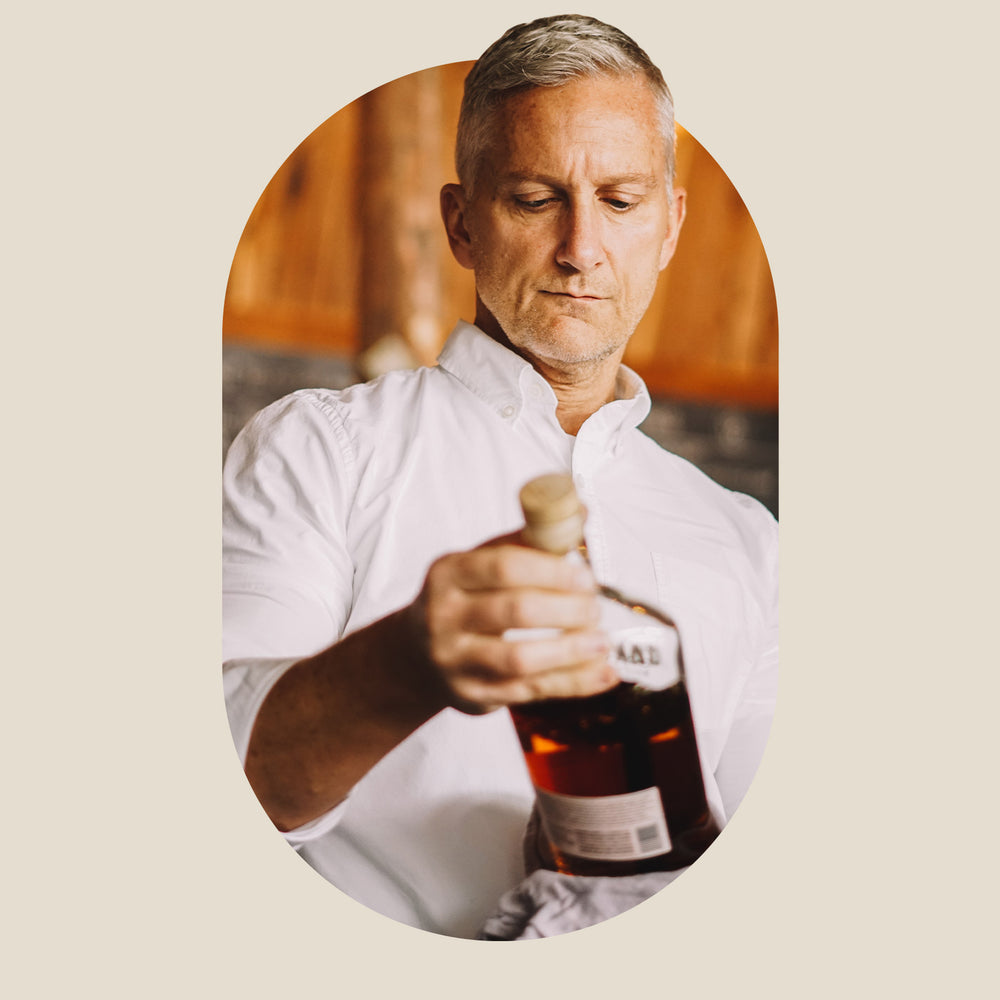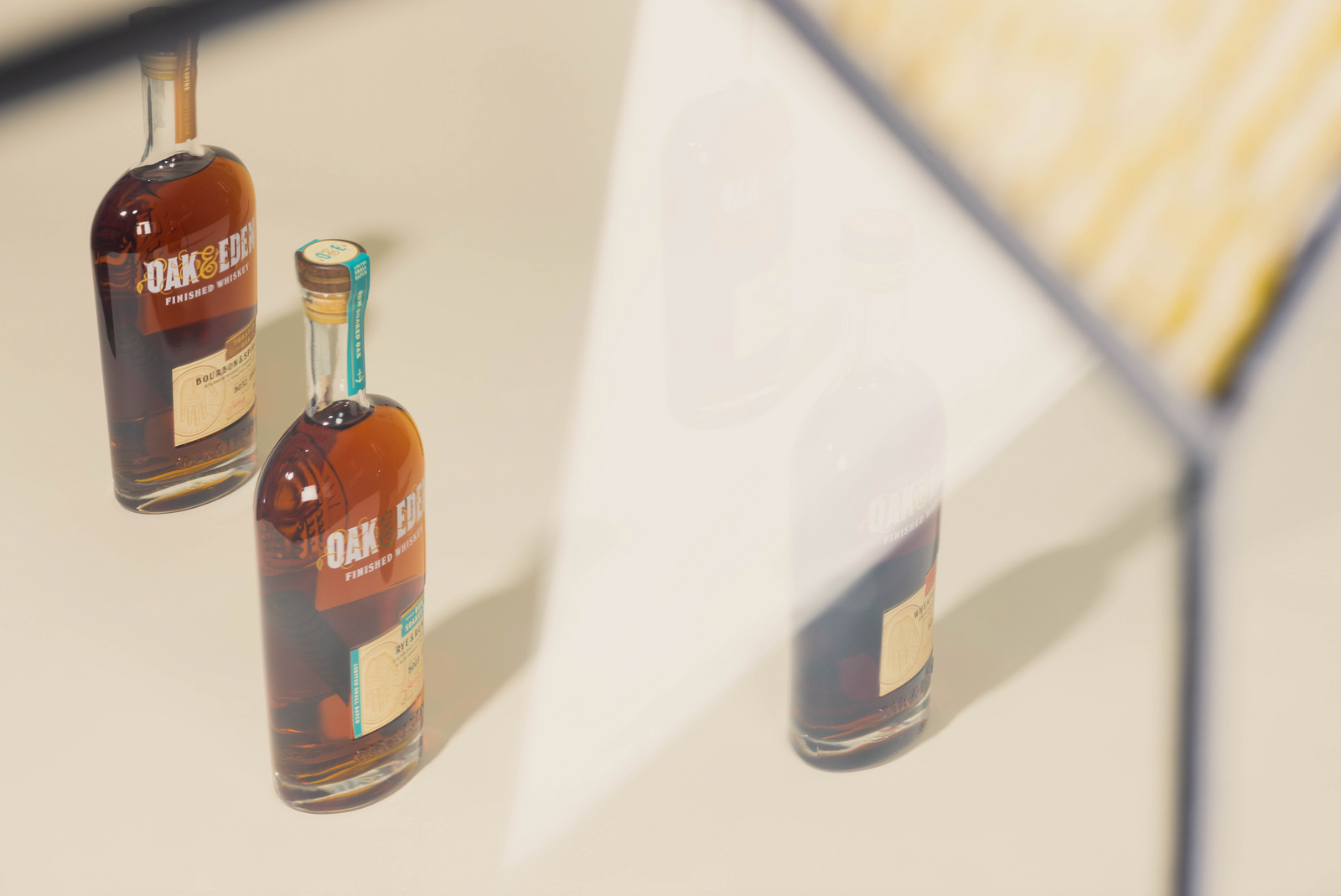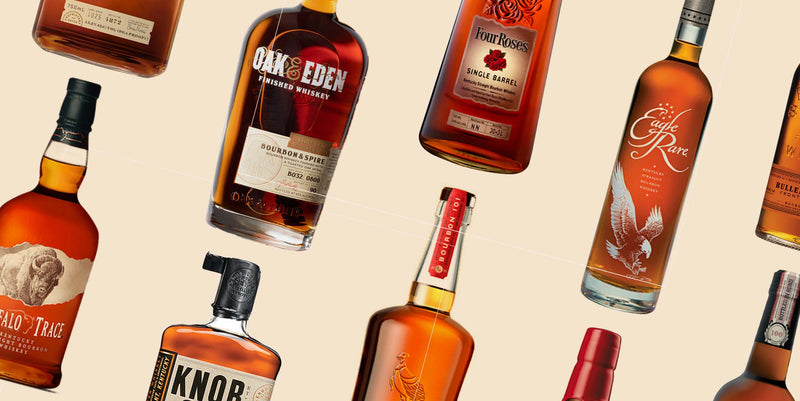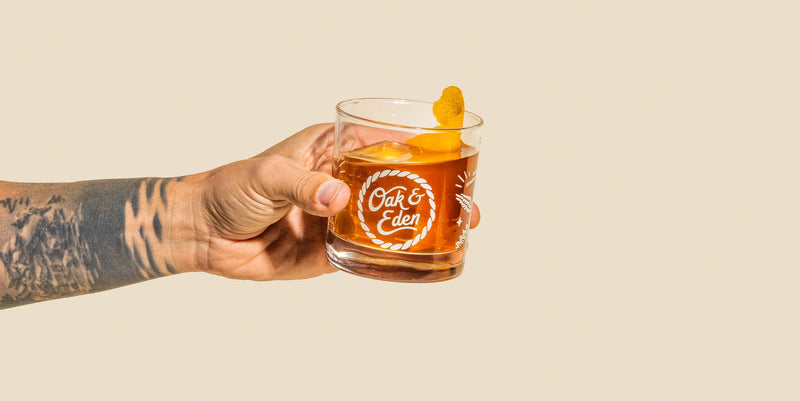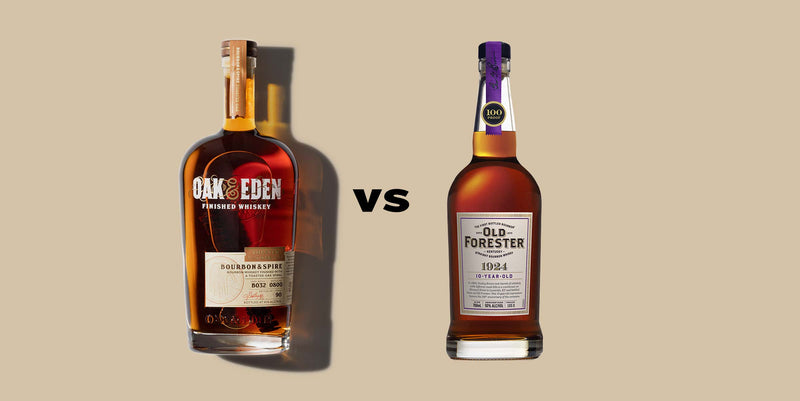Every bourbon lover knows that there is no such thing as too many bottles in your home bar. Each bottle of bourbon brings its distiller's unique take on an American classic, revealing flavors, notes, and depths that are hard to beat.
However, there is one problem that arises when you’ve got a bourbon collection: How are you supposed to store it all?
You can leave your bottles lying around, but that’s just not always the smartest move—- especially if you want your bourbon to retain its flavor as you’re storing it.
We’re here to help you take the guesswork out of storing your bourbon collection. Here is Oak and Eden’s complete guide to storing bourbon at home.
Why Store Bourbon Properly?
Before we dive into the best practices for storing your whisky properly, you may be wondering what the big deal is about storing your bourbon anyway. After all, what’s the worst that could happen? Well as it turns out, there are some less-than-ideal consequences.
When your bourbon is stored improperly, you can damage the flavors and tasting notes that the distiller worked so carefully to impart to the drink. It will decrease the shelf-life of your whiskey, can make your bourbon harsher, release unpleasant flavors, and ruin a bottle of whiskey before you even get the chance to open it.
Whether you have open bottles that you want to preserve as long as possible or special bottles you are saving for a day in the future, storing your bourbon properly is the only way to guarantee a delicious product when you pour yourself a drink.
What Are Bourbon Storage Best Practices for Opened Bottles?
Now, let’s get into the main event: storage best practices. First, you need to know what to do with your opened bottles sitting around on your shelf.
#1) Store Them Away From Light
The first practice to follow when storing your open bottles of bourbon is to store them away from light, especially direct sunlight. In fact, according to some whiskey connoisseurs, direct sunlight is the only factor that can ruin a bottle of whiskey.
This is because of the sun's UV rays, the same rays that are responsible for causing sunburn and skin cancer in humans. These UV rays cause a chemical reaction in your whiskey which can lead to the color washing out, the flavors diminishing, and stripping the whiskey of the notes and depth that took years to develop.
While you don’t have to store open bottles in a dark cavern or in a cupboard (although those are both fine ideas), you should do your best to make sure your bar or wherever they are stored is not getting direct sunlight.
#2) Limit Oxygen Exposure
As soon as you open a bottle of bourbon (or any other type of whiskey or alcohol for that matter), you’ve started the ticking clock towards expiration. A big culprit of this is exposure to oxygen.
When your bourbon is exposed to the oxygen in the air, it will quickly begin the process of oxidation, causing unpleasant changes to your whiskey over time. There are three things that you can do to limit the oxygen exposure that any open bottles of bourbon get:
- Limit the Number of Open Bottles: By limiting the number of open bottles you have, you decrease the amount of whiskey actively oxidizing. Try limiting yourself to two open bottles of bourbon at a time to keep your whiskey fresh and help it reach its full shelf-life.
- Keep Bottles Sealed: You must make sure you put the cap or cork back on your bottle every time you pour. While brief periods of time with the cap off will not impact your whiskey too much, leaving the cap off for days, weeks, or months is a surefire way to oxidize a bourbon.
- Pour Into Smaller Bottles: The final tip that you can use to limit your bourbon's oxygen exposure is to pour them into smaller bottles. As you drink your whiskey, the headspace (AKA, room for air in the bottle) increases. By continuing to pour your bottles into smaller vessels with less headroom you can get more life out of your whiskey.
#3) Store Bottles Upright
While wine is typically stored horizontally to keep the cork moist to prevent degradation, bourbon’s higher alcohol contact will actually cause the cork to degrade faster if it is in constant contact with the liquid. Keep your bottles upright to avoid issues.
#4) Maintain Consistent Temperature
The final piece of advice for your open bottles of whiskey is to maintain the temperature in your storage area. Keeping your whisky between 60 and 70 degrees Fahrenheit is an ideal range that will maintain the flavors of the whiskey over time.
What Are Bourbon Storage Best Practices for Unopened Bottles?
While the basic rules of bourbon storage still apply to unopened bottles (no sunlight, limit oxygen, store standing upright, consistent temperature), there are also some other options for the unopened, full, and sealed bottles in your collection.
Create a Display
If you have an extensive collection of bourbon whiskey or other kinds of whiskey, you may want to show it off. Having a display cabinet of some sort or even setting up a display at your home bar can let you show the world your love for bourbon while also keeping your bourbon in perfect condition.
If you are going to use lighting in your bar or storage display make sure you are using museum-grade lighting which won’t expose the liquid to UV rays or raise the temperature to an unsafe degree.
Keep in mind that bottles on display will collect dust, so you’ll need to clean them regularly and rotate them to prevent buildup.
Long-Term Storage
For your special bottles of bourbon — the ones that you are hanging on to for the long haul — you may want to find a more permanent storage solution that will preserve the bottle exactly as it was meant to be drank.
If you have a safe or vault, then you may want to store your expensive bourbons there. Not only will your vault or safe provide a dark place to store your bourbons, but it’s also a secure place to protect these valuable bourbons. As any serious collector of bourbon can tell you, the most expensive bottles in a collection can easily total into the tens or even hundreds of thousands of dollars.
Also be sure that you are storing your nice and unopened bourbon whiskey carefully to prevent damaging or tearing the labels, bottles, caps, boxes, or sleeves they came in. Just like any other collector, keeping your collection in mint condition is critical for preserving its value.
Use Off-Site Storage
If you don’t have a safe or vault, you don’t have the space for your collection at home, or you’re unable to provide a safe storage environment for your bourbon at home, then commercial and off-site storage services may be a wise option for you.
Make sure you are choosing off-site storage that is secure and temperature regulated to prevent spoiling your special bottles while they sit. Of course, you will also have to keep a close eye on your inventory and the security of the facility.
It is smart to check in every month or two to check your bottles in storage and keep a tight inventory so that missing bottles can be reported.
What Should I Do With Nearly-Empty Bottles?
While these storage tips can help you avoid wasting whiskey in the future, if you’ve already got open bottles that have been sitting around in less than ideal storage conditions (or lots of bottles near empty and no idea what to do with them), we’ve got some ideas for you, too.
If your whiskey is starting to go bad, the best solution is to finish the bottle quickly before it gets too bad. As long as you kill a bottle of whiskey that you open within about six months from opening you can be sure you’re going to get good flavor.
Consider hosting a dregs party, where you invite your guests to bring their nearly empty bottles to the party and you make the most of what you have to get rid of your scraps. This is particularly smart if you have a lot of open bottles that you can’t get through on your own.
Another fun option you can try is mixing the dramas of all your open bourbon bottles in a mason jar, decanter, or empty bottle. You should let the different bourbons meld and blend for a few weeks before tasting, and you can keep mixing and blending until you’re happy with your mixture.
Alternatively, you can keep adding the drams of future bottles as you slowly go through the drams to create an ever-evolving, home blend that is unique every time you drink it.
Basically, whatever you can do to not waste your bourbon whiskey is what you should be doing. Whiskey — even bad whiskey — is too good to let it go to waste.
Takeaways
Your bourbon is a precious commodity. You have to store it properly in order to preserve its freshness, flavor, and quality.
Be sure you are keeping all bottles of bourbon away from direct sunlight, where UV rays can cause chemical changes that diminish the flavor of your whiskey. Also be sure to keep bottles sealed when not in use, and limit their oxygen exposure to decrease oxidation.
Store bourbon in the upright position to keep the cork stopper from deteriorating due to the hinge alcohol content of whiskey. And of course, try to keep the temperature in a consistent range between 60 and 70 degrees Fahrenheit.
When storing your unopened collectible bottles, show them off with a display case or shelf — just be sure to follow all the same rules you would for unopened bottles.
If you are looking for some great whiskeys and bourbons to add to your collection you should take a look at our offerings at Oak & Eden. All of our whiskeys use our special in-bottle finishing technique, which adds more notes to our whiskeys and bourbons while they are resting in the bottle.
With these tips, you can keep your bourbon collection in pristine condition, and enjoy your bottles down to the very last drop.
Sources
How Best to Store Your Whisky | Whisky Analysis
How to Store Whiskey At Home: Things To Know (2022) | Liquor Laboratory

